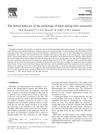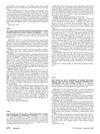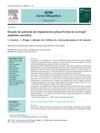 29 citations,
April 2019 in “Acta neuropathologica communications”
29 citations,
April 2019 in “Acta neuropathologica communications” Stopping mitochondrial respiration can prevent brain cancer spread in skin cancer patients, and plant compound β-sitosterol could help achieve this.
November 2023 in “IntechOpen eBooks” Arsenic exposure from contaminated water severely damages the skin, causing hair loss, pigmentation changes, irritation, and can lead to skin cancer.
 November 2023 in “Dermatologic therapy”
November 2023 in “Dermatologic therapy” The scalp serum reduced scalp discomfort and symptoms without affecting skin moisture loss.
 5 citations,
May 2021 in “International Journal of Cosmetic Science”
5 citations,
May 2021 in “International Journal of Cosmetic Science” Healthy scalp leads to better hair quality and less damage.
 September 2024 in “Journal of the American Academy of Dermatology”
September 2024 in “Journal of the American Academy of Dermatology” Oxytocin receptors are found in skin cells near touch and pain neurons.
 January 2011 in “Springer eBooks”
January 2011 in “Springer eBooks” Eating a balanced diet with the right vitamins and minerals is important for healthy hair, but too many supplements can be harmful.
 102 citations,
January 2003 in “Dermatology”
102 citations,
January 2003 in “Dermatology” Smoking may contribute to hair loss in men.
 5 citations,
March 2001 in “Journal of biomechanics”
5 citations,
March 2001 in “Journal of biomechanics” Growing hairs are easier to pull out than resting hairs due to different anchorage strengths.
 2 citations,
September 2008 in “Fertility and Sterility”
2 citations,
September 2008 in “Fertility and Sterility” Adult offspring of sperm donation generally feel positive about their conception and view the donor as their biological father.
 1 citations,
February 2020 in “Cureus”
1 citations,
February 2020 in “Cureus” Women with PCOS are more likely to have skin problems like excessive hair, acne, and hair loss.
 November 2020 in “Holistic Nursing Practice”
November 2020 in “Holistic Nursing Practice” COVID-19 can cause hair loss, loss of taste and smell, skin changes, and eye problems.
 170 citations,
December 2009 in “Histopathology”
170 citations,
December 2009 in “Histopathology” The conclusion is that accurate diagnosis of different types of hair loss requires good teamwork between skin doctors and lab experts.
 29 citations,
May 2020 in “npj Regenerative Medicine”
29 citations,
May 2020 in “npj Regenerative Medicine” Immune cells help regulate hair growth, and better understanding this can improve hair loss treatments.
 14 citations,
December 2010 in “Journal of human genetics”
14 citations,
December 2010 in “Journal of human genetics” A Japanese patient with IFAP syndrome had a severe MBTPS2 gene mutation but showed milder symptoms than previously observed cases.
 10 citations,
May 2013 in “Actas Dermo-Sifiliográficas”
10 citations,
May 2013 in “Actas Dermo-Sifiliográficas” Most white Spanish women have a widow's peak, and their hairline measurements could help in hair restoration surgery.
 42 citations,
September 2018 in “Journal der Deutschen Dermatologischen Gesellschaft”
42 citations,
September 2018 in “Journal der Deutschen Dermatologischen Gesellschaft” Adult female acne requires a comprehensive treatment approach, including medical options and lifestyle changes, with attention to psychological well-being.
 42 citations,
May 2016 in “Annual Review of Cell and Developmental Biology”
42 citations,
May 2016 in “Annual Review of Cell and Developmental Biology” Fat cells are important for tissue repair and stem cell support in various body parts.
 19 citations,
January 2015 in “Current problems in dermatology”
19 citations,
January 2015 in “Current problems in dermatology” Ultraviolet rays damage hair, smoking may cause hair loss, and good nutrition is important for hair health, but genetics mainly decide hair thickness.
16 citations,
January 2022 in “International journal of molecular sciences” Certain daily habits like stress, diet, and sleep can affect the severity of hair loss in alopecia areata.
 12 citations,
January 2005 in “Pediatric Dermatology”
12 citations,
January 2005 in “Pediatric Dermatology” Fox Fordyce disease might be more common in prepubertal girls than thought and can be managed with treatment.
9 citations,
August 2021 in “Experimental dermatology” Hidradenitis suppurativa is a skin disease caused by the breakdown of the skin's natural immune barriers, especially around hair follicles.
 7 citations,
September 2020 in “Journal of Cosmetic Dermatology”
7 citations,
September 2020 in “Journal of Cosmetic Dermatology” Smoking increases early hair loss risk in men; quitting may help prevent it.
 3 citations,
May 2021 in “Dermatologic Clinics”
3 citations,
May 2021 in “Dermatologic Clinics” The document concludes that more research is needed to understand hair loss in men and to find new treatments.
 1 citations,
March 2023 in “Frontiers in Cardiovascular Medicine”
1 citations,
March 2023 in “Frontiers in Cardiovascular Medicine” A specific gene variant is linked to heart disease, increased heart muscle, curly hair, and thick skin on palms and soles.
 336 citations,
August 2015 in “European Journal of Epidemiology”
336 citations,
August 2015 in “European Journal of Epidemiology” The Rotterdam Study found risk factors for elderly diseases, links between lifestyle and genetics with health conditions, and aimed to explore new areas like DNA methylation and sensory input effects on brain function.
 117 citations,
November 2006 in “Experimental Dermatology”
117 citations,
November 2006 in “Experimental Dermatology” The article concludes that the wool follicle is a valuable model for studying tissue interactions and has potential for genetic improvements in wool production.
 101 citations,
January 1997 in “Journal of Investigative Dermatology Symposium Proceedings”
101 citations,
January 1997 in “Journal of Investigative Dermatology Symposium Proceedings” Nerves and chemicals in the body can affect hair growth and loss.
 36 citations,
November 1961 in “Archives of Dermatology”
36 citations,
November 1961 in “Archives of Dermatology” The document suggests that the traditional understanding of hair growth cycles and alopecia may be inaccurate and that blood supply plays a significant role in hair growth and loss.
5 citations,
February 2022 in “Seminars in cell & developmental biology” Recent findings suggest that genetic factors, immune system issues, and skin cell defects might contribute to the development of hidradenitis suppurativa.
 July 2012 in “Hair transplant forum international”
July 2012 in “Hair transplant forum international” Lifestyle choices like stress, smoking, heavy drinking, sun exposure, and chemical hair treatments might speed up hair loss in people with androgenetic alopecia.


























